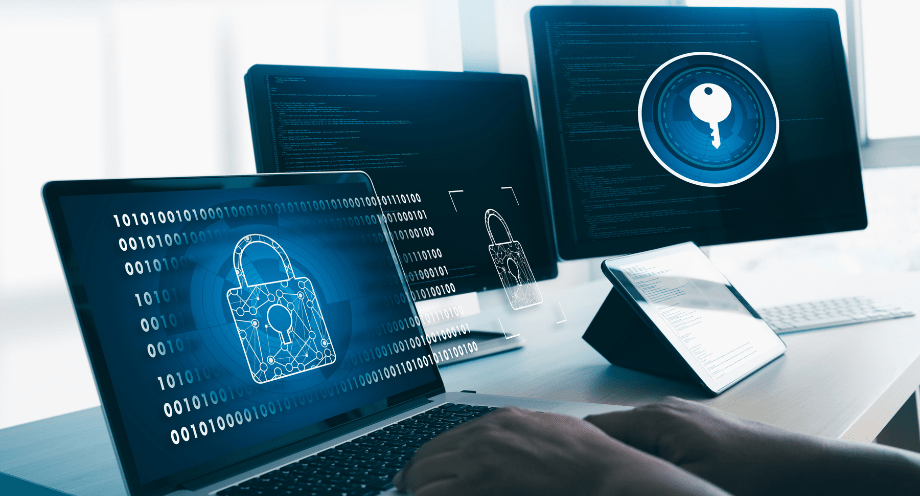Cybersecurity is becoming a fast-growing problem with small businesses becoming increasingly vulnerable to cyber threats. While large corporations often make headlines when they suffer data breaches, small businesses are actually the most frequent targets. In fact, nearly 43% of cyberattacks are aimed at small and medium-sized enterprises (SMEs).
A single cyberattack can destroy operations leading to significant drops in revenue and a decline in customer trust. The good news? With the right precautions put in place, small businesses can still significantly reduce their risk.
This blog post will cover some top cybersecurity tips to protect your business, the real-world impact of cyber threats and answers to some common security questions you may have.
What is a cyber attack?
A cyber attack is any deliberate attempt to breach a computer system, information security, or a network or device to steal, change or destroy data. Cybercriminals use a variety of techniques, including:
- Phishing – Fraudulent emails or messages can trick employees into revealing passwords or downloading dangerous malware.
- Ransomware – A type of malware that encrypts files and demands payment for their release.
- Malware – Software designed to damage or gain unauthorised access to systems.
- Denial-of-Service (DoS) attacks – Overloading a network to crash websites or services.
There are a range of cyberattacks, some coming from individual hackers, and others being organised crime groups or even state-sponsored actors. The goal is usually financial gain, but some attacks aim to disrupt security for small businesses or even steal sensitive customer data.
Cybersecurity tips for small businesses
1. Train your employees in cybersecurity awareness
Human error is one of the leading causes of data breaches. Employees who fall for phishing scams or use weak passwords unknowingly put their business at risk. It’s essential to input regular security awareness training to help staff recognise threats like malicious emails, suspicious links and social engineering tactics.
2. Conduct regular risk assessments
Risk assessments can identify vulnerabilities in your IT infrastructure, such as outdated software, weak passwords or unsecured databases. By evaluating these risks, you can prioritise security updates and prevent potential breaches.
3. Use reliable antivirus and security software
Basic antivirus software is no longer enough which is why cybersecurity is important. Invest in endpoint protection that includes real-time threat detection, ransomware blocking and automated patch management to keep your systems secure.
4. Keep software and systems updated
Hackers exploit outdated software to launch attacks. Enable automatic updates for operating systems, applications and even IoT devices (like smart office equipment) to close security gaps.
5. Back up your data regularly
A 3-2-1 backup strategy (three copies of data, stored in two different formats, with one stored offsite) ensures you can recover from ransomware or hardware failures. It’s a good idea to test backups regularly to confirm they work and to keep your small business security up to date.
6. Encrypt sensitive business data
Encryption works by scrambling data so only authorised users can read it. By using full-disk encryption for company devices and SSL/TLS for website security, you can protect transactions between your customers and your business.
7. Restrict access to confidential information
Not every employee needs access to all data. Implement role-based access controls (RBAC) to limit who can view financial records, customer databases and other sensitive files.
8. Secure your business Wi-Fi network
An unsecured Wi-Fi network is an open door for hackers. Use WPA3 encryption, hide your network’s SSID and create a separate guest network to keep internal systems safe.
9. Enforce a strong password policy
Weak passwords, like “password123”, are easy to crack and are a common cyber security threat. Ensure your employees are using complex passwords that involve 15+ characters, symbols and numbers and multi-factor authentication (MFA) for an extra layer of security.
10. Use password managers for better security
Employees often reuse passwords, which will make cyberattacks more likely to happen. Password managers generate and store strong, unique passwords for every account, reducing the risk of credential theft.
What is the impact of cyberattacks on small businesses?
Cyberattacks can have devastating consequences for small businesses, far beyond just a temporary IT issue. It’s typical for small businesses to underestimate the level of damage a breach can cause. It can cause real harm to finances, operational systems and even the overall reputation of a business.
Operational disruption can halt business activities entirely. Ransomware attacks, for example, lock business owners out of their systems, forcing operations to stop until the issue is resolved, if it can be resolved at all.
Studies show that 93% of small businesses experience operational disruptions after a cyberattack, and 21% are forced to take their websites offline while they recover. This means they are also suffering financially. By going offline, businesses will lose contact with their customer base and will have to sacrifice sales.
Sometimes this financial hit is too hard for small businesses to recover from, which is why it’s essential for you to follow these 10 cybersecurity tips to keep your business safe and keep cybersecurity threats to a minimum.
Cyber threats are an unavoidable part of running a business in the digital age. Small businesses may not have the same resources as large corporations, but with smart and intentional cybersecurity for small business practices, they can significantly reduce risks. By training employees, securing networks, encrypting data and maintaining strong backups, you can protect your business from devastating cyberattacks.
Don’t wait until it’s too late. Start implementing these essential top cybersecurity tips today to safeguard your company’s future.
If you’re looking for a reputable cybersecurity course, IBAT offers a comprehensive Diploma in Cybersecurity that will teach you everything you need to know about protecting networks and data from threats and acquiring the skills necessary to secure information.

Our Authors
Know More About Candice McDowell
FAQs
1. What is a cyber security strategy for a business?
Businesses can incorporate risk assessments, security policies, employee training and incident response protocols as a strong strategy to avoid cybersecurity threats. A strong strategy will have multiple layers, such as firewalls, encryption, access controls and backups, to minimise vulnerabilities.
2. Does my small business need cybersecurity?
Absolutely. Unfortunately, small businesses are prime targets for cybercriminals because they often lack enterprise-grade security. Nearly 46% of cyberattacks target businesses with fewer than 1,000 employees. Without proper defences, a single breach can be detrimental to your business.
3. How can I protect my business data?
There are many ways to protect your business. Acquiring cybersecurity certifications can be a great place to start to learn how to secure your business. Additionally, you can protect your business by requiring encryption for sensitive files, strict access controls, employee cybersecurity training, regular backups and multi-factor authentication (MFA) to prevent unauthorised access.
4. Why is cyber security important?
Cybersecurity is essential because it only takes one breach to destroy a small business. Beyond financial losses, these attacks lead to downtime, legal liabilities and reputational damage. Proactive security measures save money, protect customer trust, and ensure your business can continue smoothly.
5. How does cyber security work?
Cybersecurity is critical because a single breach can destroy a small business through financial losses, operational downtime, legal liabilities and reputational damage. Being proactive when it comes to security measures safeguards customer trust and keeps your business safe from threats.

